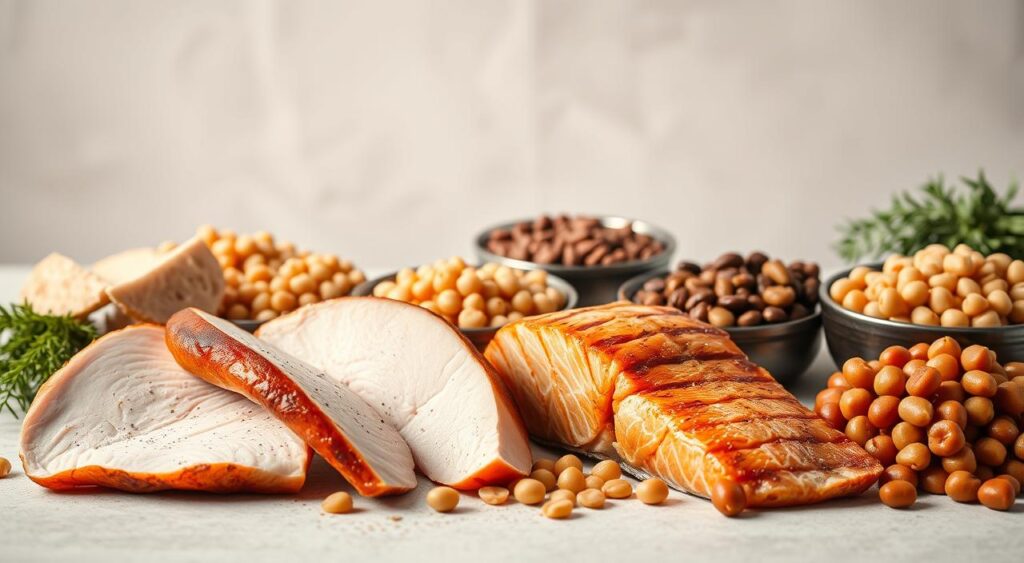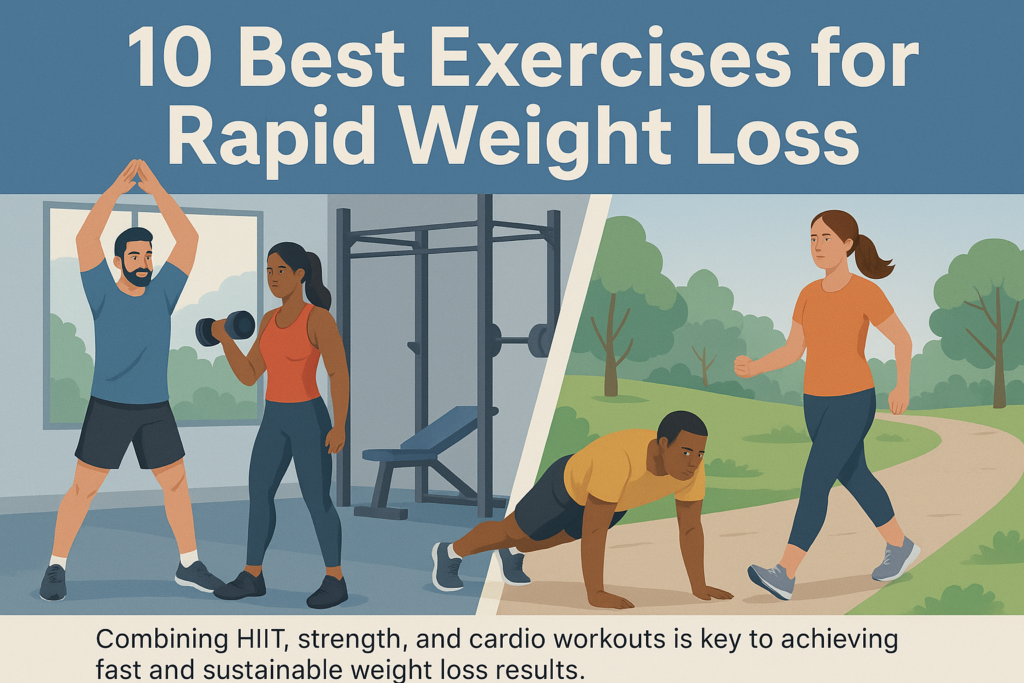Did you know adding 20-30 grams of lean protein to your meals can boost your metabolism by up to 20%? Foods like turkey, fish, and legumes are great for this. They help your body burn calories better. These foods also fuel your workouts and help keep your weight healthy.
We’ll dive into why these foods are so good for you. Turkey offers rich proteins, while fish has omega-3 fatty acids. Legumes are full of fiber. All three are top choices for boosting your metabolism.
What Are Lean Proteins and Why They Matter?
Knowing what lean proteins are is key for a healthy diet. Lean proteins have less saturated fat. They include skinless poultry, fish, legumes, and certain meats like tenderloin. These foods are good for you and help keep you healthy.
Definition of Lean Proteins
Lean proteins give your body the amino acids it needs. They have less fat, which is good for weight control and muscle growth. Eating different lean proteins helps repair and grow muscles, making them important in a balanced diet.
Importance in a Healthy Diet
Lean proteins are important in a healthy diet because they make you feel full. They give you energy without adding too many calories. Adding lean proteins to your meals helps with muscle strength, hormone production, and enzyme work. Learn more about the benefits of a high-protein diet for muscle gain in this insightful resource.
Turkey: A Lean Protein Powerhouse
Turkey is a great choice for those who want to boost their metabolism with protein. It has low fat and lots of protein, making it perfect for improving your diet. Each 3-ounce serving has about 25 grams of protein, making it a key food for boosting metabolism.
Nutritional Profile of Turkey
Turkey is not just a good source of lean protein. It also has important vitamins and minerals like B vitamins, selenium, and zinc. These nutrients help with energy and keeping your immune system strong, supporting your overall health.
Benefits of Turkey for Metabolism
Eating turkey regularly can help your metabolism in many ways. Turkey’s lean protein helps build muscle, which is important for a good metabolism. Also, your body uses more energy to digest protein, which helps with weight management and metabolism.
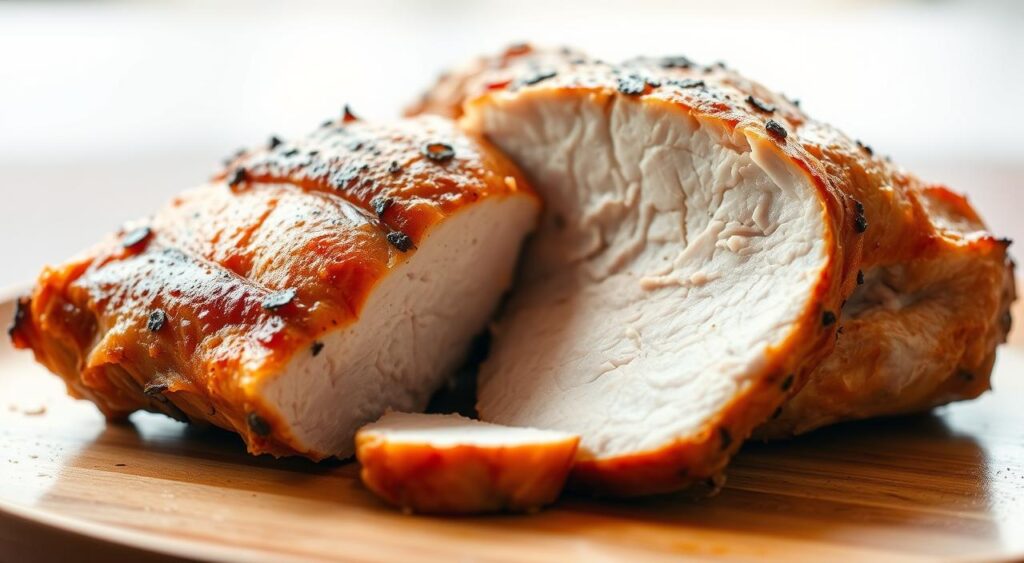
The Role of Fish in Boosting Metabolism
Eating fish can really help boost your metabolism. It’s full of lean protein and omega-3 fatty acids. These are key for a healthy diet and a faster metabolism.
Types of Fish That Are Best
- Salmon
- Mackerel
- Sardines
- Trout
- Herring
Omega-3 Fatty Acids and Their Benefits
Omega-3 fatty acids in fatty fish are great for your health. They help with weight management and improve insulin sensitivity. This makes fish a top choice for boosting metabolism.
They also reduce inflammation and are good for your heart. Adding fish to your diet can make it more balanced. It supports your body’s metabolic functions.
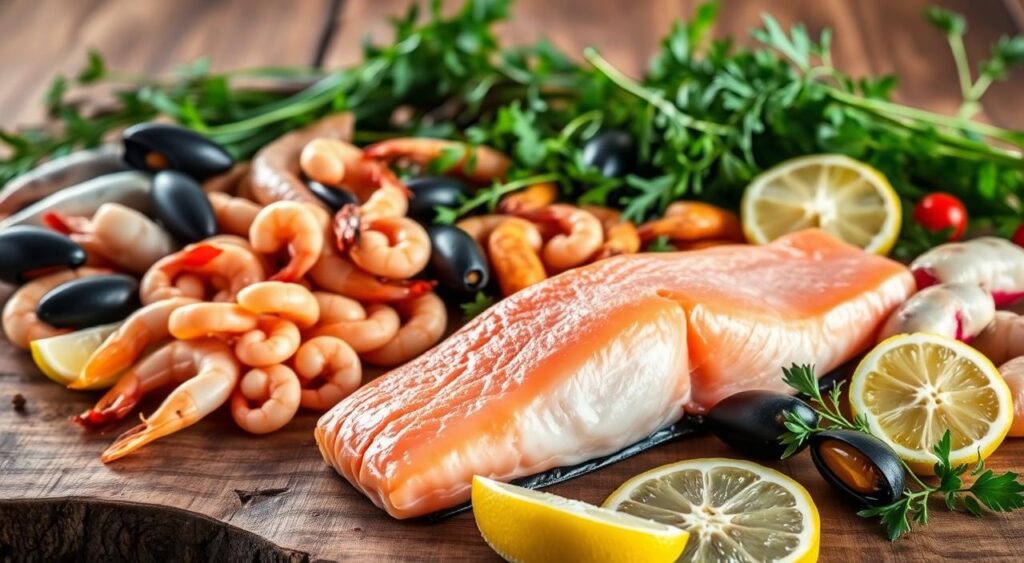
Legumes: Plant-Based Protein Options
Legumes are a great choice for adding protein to your diet. They include beans, lentils, chickpeas, and peas. These foods are easy to add to many meals. They not only offer protein but also help boost your metabolism.
Popular Types of Legumes to Include
- Black beans
- Chickpeas
- Lentils
- Kidney beans
- Peas
Metabolism-Boosting Benefits of Legumes
Legumes are packed with health benefits. They are high in dietary fiber, which aids digestion and controls blood sugar. They also increase energy use during digestion. Adding different legumes to your meals can meet your protein needs and support a healthy metabolism.
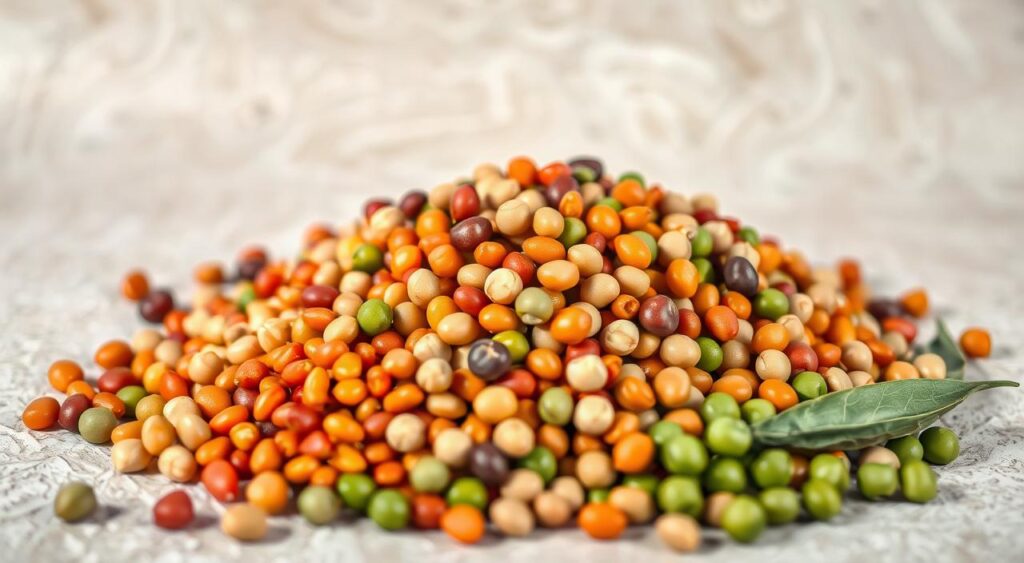
| Type of Legume | Protein (g per cup) | Fiber (g per cup) | Calories (per cup) |
|---|---|---|---|
| Black Beans | 15 | 15 | 227 |
| Chickpeas | 14.5 | 12.5 | 269 |
| Lentils | 18 | 15.5 | 230 |
| Kidney Beans | 15.3 | 13.1 | 225 |
| Peas | 8.6 | 8.8 | 118 |
How Lean Proteins Affect Your Metabolism
Lean proteins are key to boosting your metabolism. They require more energy to digest than fats and carbs. Foods like turkey, chicken, and legumes help you burn more calories.
The Thermic Effect of Food
The thermic effect of food is high for lean proteins. This means your body burns calories just by digesting these foods. Eating lean protein helps grow muscle and boosts your metabolism all day.
Muscle Mass and Metabolic Boost
Having more muscle boosts your metabolic rate. The more muscle, the more calories you burn at rest. This is great for managing weight and losing fat. Lean proteins help build muscle, working with the thermic effect to increase your metabolism.
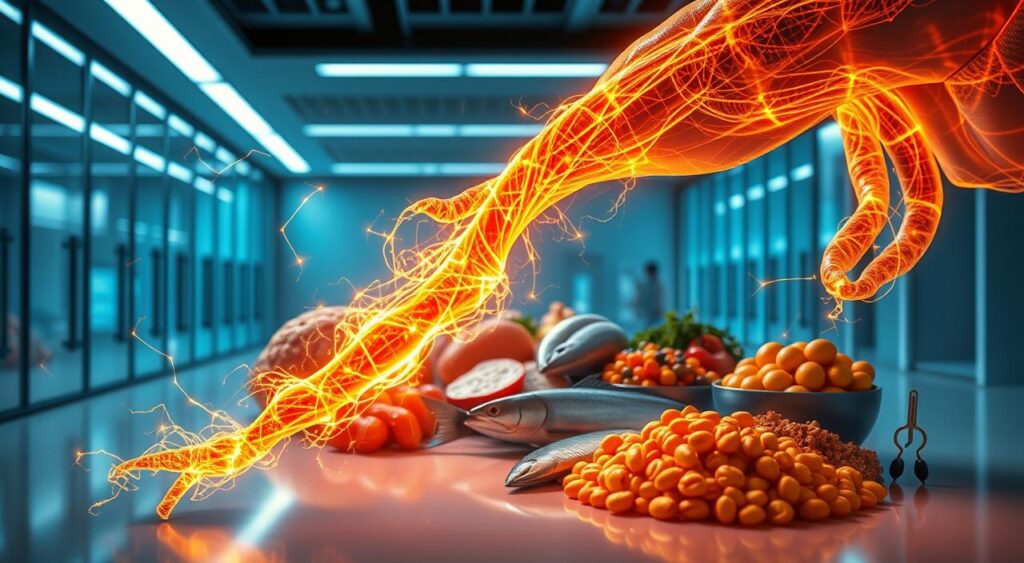
Tips for Incorporating Lean Proteins Into Your Meals
Adding lean proteins to your meals is easy and fun. Meal prep ideas can keep you organized and healthy all week. Plan your meals to ensure you have healthy options ready.
Use high protein metabolism foods to keep your energy up and support your health goals.
Meal Prep Ideas
For meal prep, choose a variety of lean proteins. Here are some ideas to get you started:
- Grilled chicken or turkey breast, marinated in your favorite spices.
- Hearty lentil soups packed with vegetables.
- Bean salads combining various legumes with fresh herbs and vinaigrette.
- Cooked quinoa mixed with sautéed vegetables and lean protein.
- Stuffed bell peppers filled with turkey, brown rice, and seasonings.
Snack Options Rich in Lean Protein
It’s also important to have protein-rich snacks. They help keep your energy up all day. Here are some good choices:
- Greek yogurt paired with nuts or seeds for added crunch.
- Hummus served with sliced veggies for a refreshing dip.
- Jerky made from lean meats for a quick protein fix.
- Cottage cheese topped with fruits or a sprinkle of cinnamon.
- Protein bars that contain natural ingredients and minimal sugars.
The Importance of Pairing Lean Proteins with Other Foods
Adding lean proteins to your diet has many benefits. But, pairing them with the right foods can make these benefits even better. This way, you get a balanced and nutritious meal that boosts your health and energy.
Complementary Nutrients for Maximum Effect
Lean proteins like turkey and fish are full of amino acids for muscle repair. Adding fiber-rich veggies and healthy fats makes the meal even better. For example, cod with spinach or a turkey wrap with avocado adds important vitamins and minerals.
This mix helps your body use nutrients better, leading to a healthier life.
Healthy Carbohydrates for Energy
Healthy carbs are key for energy, if you’re active. Foods like quinoa or brown rice go great with lean proteins. They give your body the energy it needs.
These complex carbs also keep your blood sugar stable and energy up for longer. A meal like baked salmon with quinoa and broccoli is a perfect example of a balanced diet.
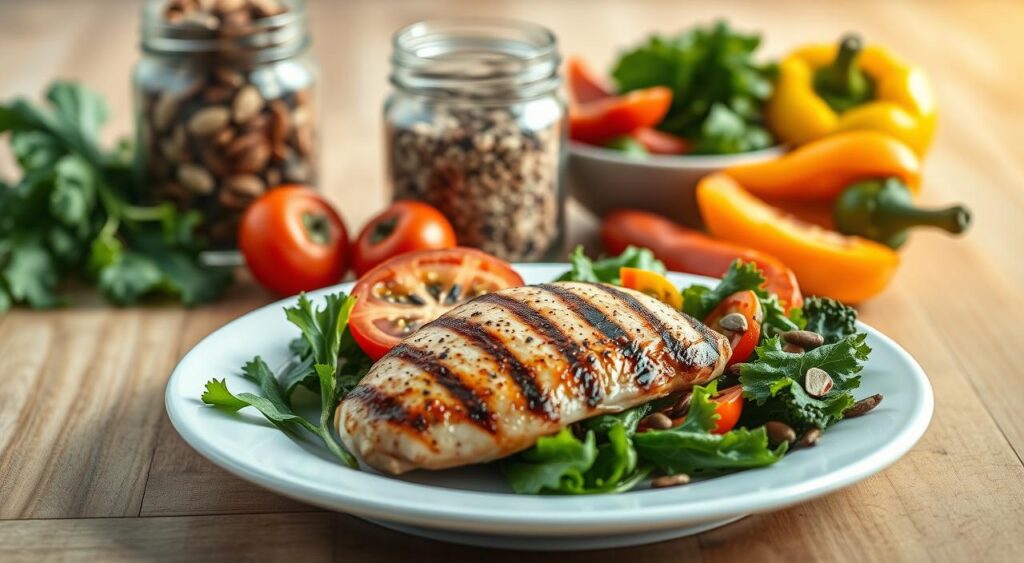
To learn more about lean proteins, check out this article on lean protein foods. Eating a balanced mix of nutrients is key to getting the most from your diet.
| Food | Protein (grams) | Carbohydrates (grams) | Fiber (grams) |
|---|---|---|---|
| Turkey (3 oz) | 25.6 | 0 | 0 |
| Cod (3 oz) | 19.4 | 0 | 0 |
| Lentils (1 cup cooked) | 17.9 | 40 | 15.6 |
| Quinoa (1 cup cooked) | 8.1 | 39 | 5.2 |
Now you know how to make meals that use lean proteins and other nutrients to their fullest.
Common Myths About Lean Proteins Debunked
It’s important to know the truth about lean proteins to make better food choices. Many people think wrong about protein sources and their benefits. This can lead to an unbalanced diet. We’ll look at two common myths that can steer you wrong.
Myth: All Proteins Are the Same
Not all proteins are created equal. They differ in amino acids, affecting their health benefits. Lean proteins like turkey and fish are better for you because they’re low in calories and high in nutrients. Choosing these options can help you stay healthy and manage your weight.
Myth: Protein Is Only for Bodybuilders
Many think protein is just for bodybuilders. But, protein is vital for everyone. It helps with tissue repair, hormone production, and keeping your immune system strong. Adding lean proteins to your diet can boost your energy and help muscles recover faster.
| Myth | Description | Truth |
|---|---|---|
| All Proteins Are the Same | Assumes all proteins provide equal nutritional benefits. | Different protein sources have varying nutrient profiles. Lean proteins support health better than red or processed meats. |
| Protein Is Only for Bodybuilders | Suggests only athletes need higher protein intake. | Everyone requires protein for essential bodily functions, not just athletes. It supports various health needs. |
Conclusion: Making Lean Proteins a Part of Your Diet
Adding lean proteins to your meals is easy and can greatly improve your health. Start by looking at what you eat now. Then, swap out high-fat meats for leaner options like turkey, fish, or legumes. This simple switch can boost your energy and help with weight control.
When you start eating more lean proteins, try different foods. Enjoy canned tuna, grilled salmon, or lentil soups. Experimenting with new recipes and flavors can make your meals fun and healthy. It also helps you get the most out of these proteins.
The goal is to enjoy eating while staying healthy. By following these easy tips, you’ll make protein-rich meals a regular part of your diet. This sets you up for a lifetime of healthy eating.

